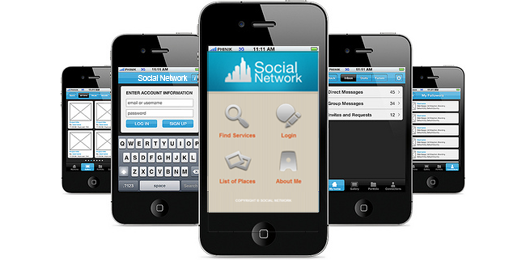
As more and more businesses pick up the need to cater for mobile technology, it’s increasingly the case that they look to mobile app developers to create unique services and flawless experiences for their customers. If you provide a digital service, or want a way to promote your other services via mobile, an app is essential.
Of course, this begs the question of how to make an app, and what method to use. iOS development is a very different beast to Android development, but it’s increasingly necessary to cater for both markets, as each has a significant share of users. So what is the preferable route to take for mobile app development? Should you go for an app native to your intended operating system, an app built on a platform, or a web-based HTML5 app?
Native apps
Native apps are the ‘gold standard’ in mobile app development – using the coding language native to the device’s operating system (Java for Android, Objective-C for iOS), a native mobile app can take full advantage of the features of the device, offering a smooth and fast experience. A native app will offer the most ‘solid’, flawless experience of the three options.
However, this performance comes at a cost. Given the specificity of each language, a larger development team may be needed for an app, and this may double in size if you want to offer the app across multiple systems – mobile app development for Android will be almost wholly different to development for iOS. As the apps are made native to device’s app stores, updating and maintaining the apps can be more expensive, too.
Native apps are a great option for a flawless user experience, but require a significant commitment to build and maintain.
Platform
More and more people are turning to platforms for their app development. Platforms often provide an all-in-one app development, maintenance and back-end solution. They allow for a single coding language to be used to build the app, which is then translated to the relevant operating system.
Platform-based apps often provide most bang-for-buck, insofar as they leverage the best technologies to create mature, reliable apps across multiple devices. As with native, platform app development is not the cheapest option, but it’s a very reliable one when cross-device compatibility, easy maintenance, and solid back-end are needed.
Web apps
Web apps are the new ‘up and coming’ contender. Much has been said (and will be said!) about the possibilities of HTML5, and it’s certain that this standard will only mature in years to come.
HTML5 apps are basically packaged websites, which means the skills required to produce them are transferable, and thus costs can be quite low. They’re more easily maintained than native and platform apps, and they are a good option for getting functionality across varying device operating systems.
However, the technology is still young, so there can be a number of drawbacks to using web apps – certain features on the device may not be accessible to web apps, and the app will almost certainly be less efficient, and slower than native and platform apps.
Look ahead
One thing that is certain is that the demand for apps isn’t going to go away. It’s important, then, to recognise that having an app developed isn’t a one-off affair, to be done quickly and forgotten about. A app is an integral part of how your customers and clients will interact with your company and brand, and expectations, both now and in the future, will need to be met, and standards maintained.
This means your mobile app development planning will need to account for the future. Not only will you want to make sure that your app will stand the test of time in functionality and looks, or, at least, that you are committed to updating these factors as and when they are needed, but you will also need to commit to the maintenance and updating of the back-end.
So always ask yourself, when choosing mobile app developers: ‘Will this stand the test of time? Will we be able to update it when necessary, and will the back-end services be maintained and relevant in the future? Will current development meet projected needs, and expected growth?’
Contact Us, a professional would be able to guide you and provide the options that better suits your needs.





